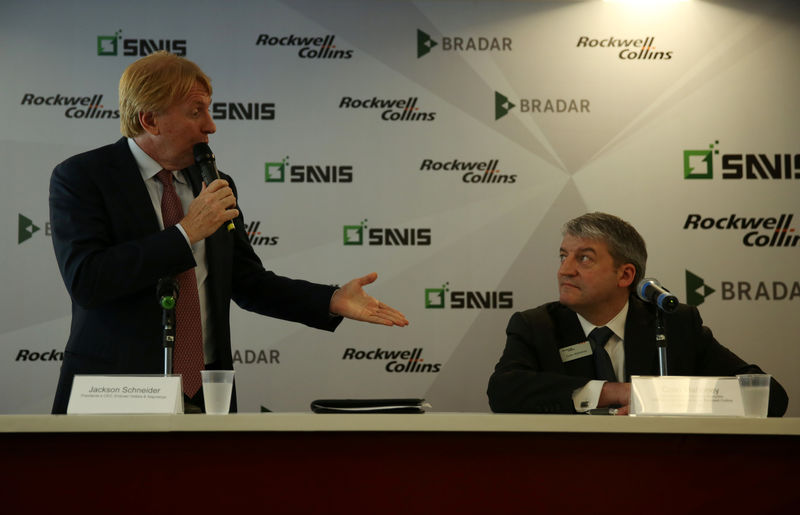By Brad Haynes
RIO DE JANEIRO (Reuters) - U.S. aviation electronics maker Rockwell Collins Inc (N:COL) and Brazilian planemaker Embraer SA (SA:EMBR3) agreed on Tuesday to work on integrating their remote sensing, targeting and communications portfolios for joint defense sales.
The announcement at the LAAD defense expo in Rio de Janeiro confirmed an earlier Reuters report that the long-time partners in the aerospace supply chain were eyeing joint sales in defense as demand in commercial aviation begins to cool.
Jackson Schneider, head of Embraer's defense division, said the partnership could eventually lead to shared development of new technologies, but for now the companies aim to combine existing products to offer more complete defense offerings.
The first opportunity identified by the firms would integrate the M20 radar made by Embraer subsidiary Bradar with the FireStorm targeting system made by Rockwell Collins to offer soldiers a portable, protected command center in the field.
Colin Mahoney, head of international and service solutions for Rockwell Collins, said the partnership made sense both technically and commercially. Mahoney highlighted his company's strategic relationships in the United States and Middle East, compared with Embraer's strength in the South American market.
"This is a two-way partnership," said Schneider, underscoring the potential for sales both in Brazil and abroad.
The executives did not venture estimates of potential revenue from their joint sales.
International partnerships are common in the aerospace industry, especially on defense contracts where government relations are key. Embraer has partnered in recent years with Boeing Co (N:BA) to sell and support the KC-390 military cargo jet and with Israel's Elbit Systems Ltd (TA:ESLT) to study a potential joint venture to build drones.
One outlet for the new Rockwell Collins partnership could be the Brazilian government's SISFRON program, which is aimed at securing long stretches of the country's remote 17,000-km (10,500-mile) border against arms and drug trafficking.
Embraer's subsidiaries have completed about 70 percent of the initial SISFRON contract, Schneider told Reuters, adding he was watching whether a federal spending freeze would hit the 450 million reais ($145 million) earmarked for the program in 2017.
He declined to comment on the chances of a much-discussed second phase for the program.

Joint sales with Rockwell Collins could open new markets to Embraer's fledgling defense portfolio, which grew as Brazil's military spending surged early this decade before the government delayed or scaled back several programs due to a deep recession.